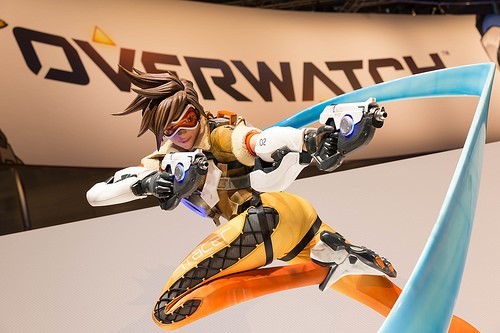Once upon a time, when games like Super Mario Bros. and Sonic the Hedgehog were the centre of the gaming world, players had a single choice for buying cartridges – forking over cash at a brick and mortar store. Today, it’s possible to buy a sixth of an episodic game (like the new Hitman) or purchase the kernel of an idea on Kickstarter and finance it with cryptocurrency.
For both play and purchasing, the options are nearly endless. However, the more business-orientated publishers and the small-time indie brands increasingly have one thing in common – through ham-fisted economics and short-sighted planning, they’re not always able to put the gamer first.
Overwatch
A recent example comes from dinosaur romp Ark. Despite not having the resources to get the game finished and out of Steam’s Early Access, the developers somehow found time to create a piece of downloadable content (DLC) that players had to pay extra for – and that’s the indie side of things; the major developers’ fondness for microtransactions is well-documented.
Overwatch managed to avoid too much criticism around its in-game economy because Blizzard promised that “loot boxes” on the cash shop would feature cosmetic items rather than gameplay essentials. Boxes can also be claimed for free in-game. However, at around one hour of play per box, there’s an obvious incentive to use real money to speed up players’ progress.
It’s the same system used in Mass Effect 3 and Dead Space 3, both of which earned EA a scolding from players. It’s perhaps just Overwatch’s incredible popularity that’s allowed the game to get away with monetised content - or maybe gamers have just got used to having to pay for things.

Bitcoin
Some of the more recent developments in the gaming world do have a more gamer-friendly focus, especially as far as real money is concerned. For example, Crowfall, an in-development MMO that has raised more than $2.4m through crowdfunding, allowed people to pledge in Bitcoin, a type of cryptocurrency that has noted benefits for the more tech-savvy customers.
Bitcoin’s fast, secure transactions have proved a boon for casino gamers in particular, with poker players no longer required to wait several days for winnings to clear before they can spend them. Some brands, like VegasCasino, a website that offers mobile slots and blackjack among other games, have abandoned fiat currencies altogether in favour of a Bitcoin-only operation. The provider in question trades solely in Bitcoin in terms of winnings, deposits and bonuses.
Bitcoin is no longer a niche payment option in gaming. Steam, Zynga, and Big Fish Games all accept the cryptocurrency, and it’s even possible to use Bitcoin to buy Overwatch on select websites.
Horse Armour
Crowdfunding, not microtransactions or payment methods, has the greatest potential to cause strife, though. With DLC and early-access titles, at least people are trading their money for something tangible, even if it is just a new outfit for Lara Croft or Bethesda’s now-infamous horse armour. Kickstarter, on the other hand, is a place where people buy promises - which, on some occasions, are sadly not exactly kept.
Granted, Crowdfunding is a great way for independent and even lone developers to get a leg up into the industry without having to finance a project with bank loans, favours, and savings.
For larger companies, Kickstarter and Indiegogo represent the equivalent of a money-printing machine, as crude as that might sound. It’s no surprise that games that found success on the platform in their early years – like post-apocalyptic RPG Wasteland 2, or Divinity: Original Sin – went back a second time to fund the sequel. Wasteland 3 raised $3.1m (£2.5m) or 113% of its requested total on similar site, Fig, late last year, while Divinity raised $2m (£1.6m) on Kickstarter.
It's the 10 year anniversary of Oblivion's Horse Armour DLC! So strange how the ecosystem has changed since then pic.twitter.com/tyaAZnGsK4
— Josh Ling / Tactful (@tactful) 6 April 2016
Red Tape
There’s no disguising the fact that only a third of games funded on Kickstarter actually make it to the consumer, though.
The problem is that pledging on a crowdfunding site doesn’t really mean anything. There are few if any legal obligations to deliver. The list of developers that raised tens of thousands and promptly disappeared is almost as long as the one that contains Shovel Knight, Hyper Light Drifter, and The Banner Saga - all great games that did emerge from the abyss of crowdfunding.
Crowdfunding is more of a bet on the integrity (and ability) of a developer than an investment in a promising idea. Obviously, nobody goes into a campaign just to watch it fail, but indie creators lack the enormous resources and pressure that publishers like EA can place on their subsidiaries (BioWare, for example) to deliver on a daily basis, so things do go awry and once-dedicated people can miscalculate or even get bored.
Going forward, it's probably fair to say that crowdfunding is likely to continue its one-in-three hit rate, simply because Kickstarter and Indiegogo are two worlds built on assurances, however misguided they might be.
To read the latest guides, news, and features you can visit our Miscellaneous Game Page.




